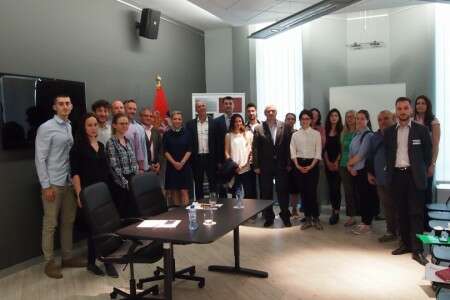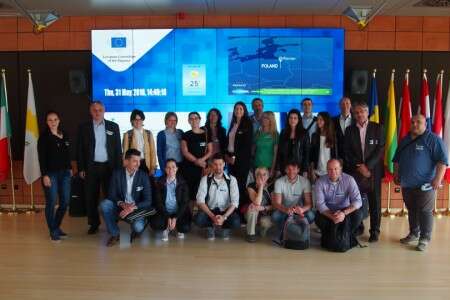Representatives of 20 partner civil society organizations and media participated in a study visit to Brussels from May 28th to June 1st 2018 within the project "Civil Society as a Force for Change in the Serbia's EU Accession Process". The visit included over 30 meetings to EU institutions, civil society organizations and media in Brussels.
The participants had the opportunity to visit and learn more about EU institutions, including the Council of the EU, the European Council, the European Commission, the European Parliament, the European Economic and Social Committee and the European Committee of the Regions. Also, they met with officials who are directly in charge and monitor developments and the process of European integration in our region, or who report and advise senior EU officials in charge of enlargement.
In addition to group visits to institutions, participants were divided into smaller, thematic groups within which they met with various civil society organizations and media dealing with topics such as environmental protection, the rule of law and media and youth policies. In this regard, organizations such as Greenpeace, Euractiv, the European Policy Center, the European Commission's Directorate-General for Education and Youth are just some that participants visited.
What the group noticed is that the Brussels’ "audience" is primarily focused on the relationship between Belgrade and Priština. However, what Serbia should expect in the process of EU accession is firm monitoring of the negotiating chapters 23 and 24. Concrete problems which will be carefully examined will be: quality of debates and the functioning of the Serbian National Assembly, the adoption of a large number of laws without an adequate public debate and through quick procedures, media freedom, rule of law, frequent parliamentary elections and respect for electoral procedures. Officials themselves have admitted many times to "live in the Brussels bubble" and to have limited access to information directly from the field. Therefore, they incredibly appreciate knowledge that comes from civil society and media to make the complete image.
In addition, together with discussing key issues in the process of Serbia's EU accession and integration, the group visited European Economic and Social Committee and the European Committee of the Regions and could see how the EU values can indeed live and institutionalize. Both institutions are EU advisory bodies, which are largely comprised of different types of organizations, contributing to legislative acts with the help of other groups such as civil society, representatives of entrepreneurs from the EU. Through several picturesque examples participants noticed that these institutions are not only political, but they also nurture freedom of thought, innovation, knowledge and listen to what civil society has to say.
Finally, European integration and the accession of Serbia to the EU is a very complex, but not necessarily an unexplainable process. It is obvious that the process will only contribute to Serbia in the future, but civil society organizations and media must monitor its comprehensive implementation and work to include as many people as possible.
The project "Civil Society as a Force for Change in the Serbia's EU Accession Process ", as well as the training program, aims to support active participation in the process of Serbia's EU accession through project and institutional support to civil society organizations and the media. Belgrade Open School, within the second year of the CS4EU project, has 17 partners from Subotica, Novi Sad, Belgrade, Niš, Prijepolje, Prokuplje, Užice, Kruševac, Loznica, Valjevo, Pirot, Kragujevac and Arilje. Through this network of organizations and media from all over Serbia, BOS strives to improve the quality of the European integration process and contribute to democratic development in Serbia by strengthening the role of civil society and bringing European integration closer to the needs of citizens. The realization of the three-year project is supported by the Kingdom of Sweden.


